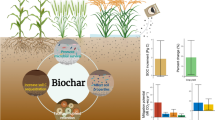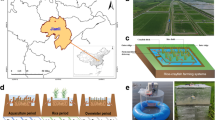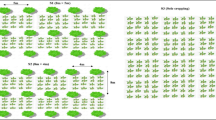Abstract
Purpose
On a global scale, water resources are under intense stress due to climate change. It is, therefore, crucial to understand how in situ water harvesting techniques and the addition of soil organic amendments such as biochar affect soil properties and productivity of alfalfa (Medicago sativa L.) to inform wider adoption by farmers.
Methods
To contribute to this research area, an experiment was conducted at the Anjiagou Catchment experimental station during the 2020 to 2021 alfalfa growing seasons. The experimental design was a split-plot design with three replications. The main treatment was maize straw biochar, and the sub-treatment was ridge-furrow rainwater harvesting. The biochar treatments were 30 t ha−1 and 0 t ha−1, and the rainwater harvesting methods were flat planting (FP), tied-ridging (TR), and open-ridging (OR).
Results
In 2020, soil temperature in the TR treatment decreased by 6.54 and by 4.08% for the OR treatment compared with the FP. In 2021, soil temperature decreased by 3.87 and 0.87% in the TR and OR, respectively, compared with the FP. In general, the integration of rainwater harvesting systems and maize straw biochar amendment significantly (p < 0.05) increased alfalfa fodder yield during the 2-year growing seasons investigated. Mean soil desiccation increased by 55.16% in the no-biochar–amended treatment compared to 52.58% for the biochar-amended soils. Overall, the highest net economic benefit throughout the 2 years of alfalfa cultivation was recorded in the TR and OR treatments with maize straw biochar addition.
Conclusion
In both experimental years, ridge-furrow rainwater harvesting-planting with maize straw biochar produced the highest alfalfa fodder yield than the FP treatment and the no-biochar–amended soil. An important contribution of this work to smallholder forage farming is the evidence demonstrating the positive effects of maize straw biochar in ridge-furrow rainwater harvesting system on alfalfa fodder yield, water productivity, and economic benefit in rain-fed agriculture.






Similar content being viewed by others
References
Al-Kaisi MM, Lal R (2017) Conservation agriculture systems to mitigate climate variability effects on soil health. In: Soil Health and Intensification of Agroecosystems. Academic Press, pp 79–107
Ali S, Jan A, Zhang P, Khan MN, Cai T, Wei T, Ren X, Jia Q, Han Q, Jia Z (2016) Effects of ridge-covering mulches on soil water storage and maize production under simulated rainfall in semiarid regions of China. Agric Water Manag. https://doi.org/10.1016/j.agwat.2016.09.003
Ali S, Ma X, Jia Q, Ahmad I, Ahmad S, Sha Z, Yun B, Muhammad A, Ren X, Shah S, Akbar H, Cai T, Zhang J, Jia Z (2019) Supplemental irrigation strategy for improving grain filling, economic return, and production in winter wheat under the ridge and furrow rainwater harvesting system. Agric Water Manag 226:105842. https://doi.org/10.1016/j.agwat.2019.105842
Araya A, Stroosnijder L (2010) Effects of tied ridges and mulch on barley (Hordeum vulgare) rainwater use efficiency and production in Northern Ethiopia. Agric Water Manag 97:841–847. https://doi.org/10.1016/j.agwat.2010.01.012
Bajgai Y, Hulugalle N, Kristiansen P, McHenry M, Cowie A (2014) Residue incorporation mitigates tillage-induced loss of soil carbon in laboratory microcosms. Soil Use Manag 30:328–336. https://doi.org/10.1111/sum.12130
Basu RN (2011) Global climate change vis-à-vis agriculture and food security. SATSA Mukhaptra Annual Technical Issue, 15:1–27
Bhargava AK, Vagen T, Gassner A (2018) Breaking ground : unearthing the potential of high-resolution, remote-sensing soil data in understanding agricultural profits and technology use in Sub-Saharan Africa. World Dev 105:352–366. https://doi.org/10.1016/j.worlddev.2017.07.015
Borthakur PK, Bhattacharyya RK, Das U (2019) Biochar in organic farming. Organic farming. Springer, Cham, pp 109–134
Chen L, Yang L, Wei W (2013) Towards sustainable integrated watershed ecosystem management : a case study in Dingxi on the Loess Plateau. China. https://doi.org/10.1007/s00267-011-9807-0
Cowan JS, Inglis DA, Miles CA (2013) Deterioration of three potentially biodegradable plastic mulches before and after soil incorporation in a broccoli field production system in Northwestern Washington. Horttechnology 23:849–858. https://doi.org/10.21273/horttech.23.6.849
Daryanto S, Wang L, Jacinthe PA (2017) Can ridge-furrow plastic mulching replace irrigation in dryland wheat and maize cropping systems? Agric Water Manag. https://doi.org/10.1016/j.agwat.2017.05.005
Datta D, Chandra S, Nath CP, Kar G, Ghosh S, Chaturvedi S, Bhatnagar A, Singh G, Singh V (2022) Soil-plant water dynamics, yield, quality and profitability of spring sweet corn under variable irrigation scheduling, crop establishment and moisture conservation practices. F Crop Res 279:108450. https://doi.org/10.1016/j.fcr.2022.108450
Díaz-Pérez JC, Dean Batal K (2002) Colored plastic film mulches affect tomato growth and yield via changes in root-zone temperature. J Am Soc Hortic Sci 127:127–135. https://doi.org/10.21273/jashs.127.1.127
Duan C, Chen J, Li J, Feng H, Wu S, Meng Q, Siddique KHM (2022) Effects of organic amendments and ridge–furrow mulching system on soil properties and economic benefits of wolfberry orchards on the Tibetan Plateau. Sci Total Environ 827:154317. https://doi.org/10.1016/j.scitotenv.2022.154317
Eche D (2018) Analysis of the food security in family farming in Northern Ecuador. Revista Agroalimentaria 24:91–112
Enfors E, Barron J, Makurira H, Rockström J, Tumbo S (2011) Yield and soil system changes from conservation tillage in dryland farming: a case study from North Eastern Tanzania. Agric Water Manag. https://doi.org/10.1016/j.agwat.2010.02.013
Fang H, Li Y, Gu X, Li Y, Chen P (2021) Can ridge-furrow with film and straw mulching improve wheat-maize system productivity and maintain soil fertility on the Loess Plateau of China? Agric Water Manag 246:106686. https://doi.org/10.1016/j.agwat.2020.106686
Feng Y, Hao W, Gao L, Li H, Gong D, Cui N (2019) Comparison of maize water consumption at different scales between mulched and non-mulched croplands. Agric Water Manag. https://doi.org/10.1016/j.agwat.2019.02.016
Genesio L, Miglietta F, Lugato E, Baronti S, Pieri M, Vaccari FP (2012) Surface albedo following biochar application in durum wheat. Environ Res Lett 7:014025. https://doi.org/10.1088/1748-9326/7/1/014025
Gong D, Mei X, Hao W, Wang H, Caylor KK (2017) Comparison of multi-level water use efficiency between plastic film partially mulched and non-mulched croplands at eastern Loess Plateau of China. Agric Water Manag 179:215–226. https://doi.org/10.1016/j.agwat.2016.06.006
Gonzaga MIS, Mackowiak C, de Almeida AQ, de Carvalho Junior JIT, Andrade KR (2018) Positive and negative effects of biochar from coconut husks, orange bagasse and pine wood chips on maize (Zea mays L.) growth and nutrition. CATENA 162:414–420. https://doi.org/10.1016/j.catena.2017.10.018
Güereña D, Lehmann J, Hanley K, Enders A, Hyland C, Riha S (2013) Nitrogen dynamics following field application of biochar in a temperate North American maize-based production system. Plant Soil 365:239–254. https://doi.org/10.1007/s11104-012-1383-4
Guo S, Jiang R, Qu H, Wang Y, Misselbrook T, Gunina A, Kuzyakov Y (2019) Fate and transport of urea-N in a rain-fed ridge-furrow crop system with plastic mulch. Soil Tillage Res 186:214–223. https://doi.org/10.1016/j.still.2018.10.022
Haapala T, Palonen P, Korpela A, Ahokas J (2014) Feasibility of paper mulches in crop production - a review. Agric Food Sci 23:60–79. https://doi.org/10.23986/afsci.8542
Hardie M, Clothier B, Bound S, Oliver G, Close D (2014) Does biochar influence soil physical properties and soil water availability? Plant Soil 376:347–361. https://doi.org/10.1007/s11104-013-1980-x
Helgadottir A, Pötsch E (2007) Quality legume-based forage systems for contrasting environments. Eur Coop Sci Technol. http://www.cost.eu/COST_Actions/fa/852. Accessed 5 May 2016
IPCC (2022) Climate Change 2022: Impacts, Adaptation, and Vulnerability. Contribution of Working Group II to the Sixth Assessment Report of the Intergovernmental Panel on Climate Change [Pörtner H-O, Roberts DC, Tignor M, Poloczanska ES, Mintenbeck K, Alegría A, Craig M, Langsdorf S, Löschke S, Möller V, Okem A, Rama B (eds.)]. Cambridge University Press. In Press
Jabran K (2019) Role of mulching in pest management and agricultural sustainability. Springer International Publishing, Cham
Janeiro CN, Arsénio AM, Brito RMCL, van Lier JB (2020) Use of (partially) treated municipal wastewater in irrigated agriculture; potentials and constraints for sub-Saharan Africa. Phys Chem Earth. https://doi.org/10.1016/j.pce.2020.102906
Jiang R, Li X, Zhou M, Li HJ, Zhao Y, Yi J, Le CL, Li M, Zhang JG, Qu D (2016) Plastic film mulching on soil water and maize (Zea mays L.) yield in a ridge cultivation system on Loess Plateau of China. Soil Sci Plant Nutr 62:1–12. https://doi.org/10.1080/00380768.2015.1104642
Jiménez MN, Fernández-Ondoño E, Ripoll MÁ, Castro-Rodríguez J, Huntsinger L, Navarro FB (2016) Stones and organic mulches improve the Quercus Ilex L. Afforestation success under Mediterranean climatic conditions. L Degrad Dev 27:357–365. https://doi.org/10.1002/ldr.2250
Jin S, Wang Y, Wang X, Bai Y, Shi L (2019) Effect of pruning intensity on soil moisture and water use efficiency in jujube (Ziziphus jujube Mill.) plantations in the hilly Loess Plateau Region. China J Arid Land 11:446–460. https://doi.org/10.1007/s40333-019-0129-z
Jordán A, Zavala LM, Gil J (2010) Effects of mulching on soil physical properties and runoff under semi-arid conditions in southern Spain. CATENA 81:77–85. https://doi.org/10.1016/j.catena.2010.01.007
Laird DA, Fleming P, Davis DD, Horton R, Wang B, Karlen DL (2010) Impact of biochar amendments on the quality of a typical Midwestern agricultural soil. Geoderma 158:443–449. https://doi.org/10.1016/j.geoderma.2010.05.013
Lanckriet S, Araya T, Cornelis W, Verfaillie E, Poesen J, Govaerts B, Bauer H, Deckers J, Haile M, Nyssen J (2012) Impact of conservation agriculture on catchment runoff and soil loss under changing climate conditions in May Zeg-zeg (Ethiopia). J Hydrol. https://doi.org/10.1016/j.jhydrol.2012.10.011
Lebel S, Fleskens L, Forster PM, Jackson LS, Lorenz S (2015) Evaluation of in situ rainwater harvesting as an adaptation strategy to climate change for maize production in rainfed Africa. Water Resour Manag 29:4803–4816. https://doi.org/10.1007/s11269-015-1091-y
Li C, Feng H, Luo X, Li Y, Wang N, Wu W, Zhang T, Dong Q, Siddique KHM (2022) Limited irrigation and fertilization in sand-layered soil increases nitrogen use efficiency and economic benefits under film mulched ridge-furrow irrigation in arid areas. Agric Water Manag 262:107406. https://doi.org/10.1016/j.agwat.2021.107406
Li SX, Wang ZH, Li SQ, Gao YJ, Tian XH (2013) Effect of plastic sheet mulch, wheat straw mulch, and maize growth on water loss by evaporation in dryland areas of China. Agric Water Manag 116:39–49. https://doi.org/10.1016/j.agwat.2012.10.004
Liu P, Wang H, Li L, Liu X, Qian R, Wang J, Yan X, Cai T, Zhang P, Jia Z, Ren X, Chen X (2020) Ridge-furrow mulching system regulates hydrothermal conditions to promote maize yield and efficient water use in rainfed farming area. Agric Water Manag 232:106041. https://doi.org/10.1016/j.agwat.2020.106041
Ma D, Chen L, Qu H, Wang Y, Misselbrook T, Jiang R (2018) Impacts of plastic film mulching on crop yields, soil water, nitrate, and organic carbon in Northwestern China: a meta-analysis. Agric Water Manag 202:166–173. https://doi.org/10.1016/j.agwat.2018.02.001
Mak-Mensah E, Obour PB, Essel E, Wang Q, Ahiakpa JK (2021a) Influence of plastic film mulch with biochar application on crop yield, evapotranspiration, and water use efficiency in northern China: a meta-analysis. PeerJ 9:e10967. https://doi.org/10.7717/peerj.10967
Mak-Mensah E, Obour PB, Wang Q (2021b) Influence of tied-ridge-furrow with inorganic fertilizer on grain yield across semiarid regions of Asia and Africa: a meta-analysis. PeerJ 9:e11904. https://doi.org/10.7717/peerj.11904
Mak-Mensah E, Sam FE, Safnat Kaito IOI, Zhao W, Zhang D, Zhou X, Wang X, Zhao X, Wang Q (2021c) Influence of tied-ridge with biochar amendment on runoff, sediment losses, and alfalfa yield in northwestern China. PeerJ 9:e11889. https://doi.org/10.7717/peerj.11889
Mak-Mensah E, Yeboah FK, Obour PB, Usman S, Essel E, Bakpa EP, Zhang D, Zhou X, Wang X, Zhao X, Zhao W, Wang Q, Adingo S, Ahiakpa JK (2022a) Integration of ridge and furrow rainwater harvesting systems and soil amendments improve crop yield under semi-arid conditions. Paddy Water Environ. https://doi.org/10.1007/s10333-022-00900-y
Mak-Mensah E, Zhang D, Zhou X, Zhao X, Wang X, Zhao W, Wang Q, Ahiakpa JK (2022b) Effect of co-application of ridge-furrow rainwater harvesting and mulching on fodder yield, quality, and soil desiccation in Alfalfa (Medicago sativa) production. J Soil Sci Plant Nutr. https://doi.org/10.1007/s42729-022-00829-5
Martinsen V, Mulder J, Shitumbanuma V, Sparrevik M, Børresen T, Cornelissen G (2014) Farmer-led maize biochar trials: effect on crop yield and soil nutrients under conservation farming. J Plant Nutr Soil Sci 177:681–695. https://doi.org/10.1002/jpln.201300590
McHugh OV, Steenhuis TS, Abebe B, Fernandes ECM (2007) Performance of in situ rainwater conservation tillage techniques on dry spell mitigation and erosion control in the drought-prone North Wello zone of the Ethiopian highlands. Soil Tillage Res 97:19–36. https://doi.org/10.1016/j.still.2007.08.002
Michelon N, Pennisi G, Ohn Myint N, Orsini F, Gianquinto G (2020) Strategies for improved water use efficiency (WUE) of field-grown lettuce (Lactuca sativa L.) under a semi-arid climate. Agronomy 10. https://doi.org/10.3390/agronomy10050668
Mo F, Wang J-YY, Xiong Y-CC, Nguluu SN, Li F-MM (2016) Ridge-furrow mulching system in semiarid Kenya: a promising solution to improve soil water availability and maize productivity. Eur J Agron 80:124–136. https://doi.org/10.1016/j.eja.2016.07.005
Mukherjee A, Lal R (2013) Biochar impacts on soil physical properties and greenhouse gas emissions. Agronomy 3:313–339. https://doi.org/10.3390/agronomy3020313
Mupangwa W, Love D, Twomlow S (2006) Soil – water conservation and rainwater harvesting strategies in the semi-arid Mzingwane Catchment, Limpopo Basin. Zimbabwe 31:893–900. https://doi.org/10.1016/j.pce.2006.08.042
Nalivata P, Kibunja C, Mutegi J, Tetteh F, Tarfa B, Dicko MK, Ouattara K, Cyamweshi RA, Nouri MK, Wortmann CS (2017) Integrated soil fertility management in Sub-Saharan Africa. Fertilizer use optimization in sub-Saharan Africa 25–39
Ndlangamandla MT, Ndlela ZP, Manyatsi AM (2016) Mulching and tied ridges as a moisture conservation strategy to improve the yield of sorghum (Sorghum Bicolor) in semi-arid parts of Swaziland. Int J Environ Agric Res 2:2012–2015
Nuti RC, Lamb MC, Sorensen RB, Truman CC (2009) Agronomic and economic response to furrow diking tillage in irrigated and non-irrigated cotton (Gossypium hirsutum L.). Agric Water Manag 96:1078–1084. https://doi.org/10.1016/j.agwat.2009.03.006
Nyamadzawo G, Wuta M, Nyamangara J, Gumbo D (2013) Opportunities for optimization of in-field water harvesting to cope with changing climate in semi-arid smallholder farming areas of Zimbabwe. Springerplus 2:1–9. https://doi.org/10.1186/2193-1801-2-100
Prosdocimi M, Jordán A, Tarolli P, Keesstra S, Novara A, Cerdà A (2016) The immediate effectiveness of barley straw mulch in reducing soil erodibility and surface runoff generation in Mediterranean vineyards. Sci Total Environ. https://doi.org/10.1016/j.scitotenv.2015.12.076
Ren X, Zhang P, Chen X, Guo J, Jia Z (2016) Effect of different mulches under rainfall concentration system on corn production in the semi-arid areas of the Loess Plateau. Sci Rep 6:1–10. https://doi.org/10.1038/srep19019
Sadiq M, Li G, Rahim N, Tahir MM (2021) Sustainable conservation tillage technique for improving soil health by enhancing soil physicochemical quality indicators under wheat mono-cropping system conditions. Sustain. https://doi.org/10.3390/su13158177
Sarkar S, Singh SR (2007) Interactive effect of tillage depth and mulch on soil temperature, productivity and water use pattern of rainfed barley (Hordium vulgare L.). Soil Tillage Res. https://doi.org/10.1016/j.still.2006.01.014
Silungwe FR, Graef F, Bellingrath-Kimura SD, Chilagane EA, Tumbo SD, Kahimba FC, Lana MA (2019) Modelling rainfed pearl millet yield sensitivity to abiotic stresses in semi-arid central Tanzania. Eastern Africa Sustain. https://doi.org/10.3390/su11164330
Szymańska R, Ślesak I, Orzechowska A, Kruk J (2017) Physiological and biochemical responses to high light and temperature stress in plants. Environ Exp Bot 139:165–177
Tao Z, Li H, Neil E, Si B (2021) Groundwater recharge in hillslopes on the Chinese Loess Plateau. J Hydrol Reg Stud 36:100840. https://doi.org/10.1016/j.ejrh.2021.100840
Thidar M, Gong D, Mei X, Gao L, Li H, Hao W, Gu F (2020) Mulching improved soil water, root distribution and yield of maize in the Loess Plateau of Northwest China. Agric Water Manag 241:106340. https://doi.org/10.1016/j.agwat.2020.106340
Univer T, Põrk K, Univer N (2009) Living grass mulches in strawberry cultivation. Agron Res 7:532–535
Usio N, Lailati M, Huynh TQ, Shang Y, Ito K, Katsumi N, Mizuuchi Y, Ino M (2021) Effectiveness of ground bamboo mulching in suppressing weeds and enhancing rice production: a microcosm experiment. Paddy Water Environ 19:159–171. https://doi.org/10.1007/s10333-020-00827-2
Vega JA, Fernández C, Fonturbel T (2015) Comparing the effectiveness of seeding and mulching+seeding in reducing soil erosion after a high severity fire in Galicia (NW Spain). Ecol Eng 74:206–212. https://doi.org/10.1016/j.ecoleng.2014.10.019
Wade T (2018) Modeling effects of rainwater harvesting systems on water yield increase and non-beneficial evaporation reduction to sustain agriculture in a water-scarce region of China. Old Dominion University
Wang W, Gong Y, Xing X (2020) Groundwater evaporation for salt-affected soil under plastic film-covered cultivation condition: a review. J Soil Sci Plant Nutr. https://doi.org/10.1007/s42729-020-00207-z
Wei W, Chen L, Zhang H, Chen J (2015) Effect of rainfall variation and landscape change on runoff and sediment yield from a loess hilly catchment in China. Environ Earth Sci 73:1005–1016. https://doi.org/10.1007/s12665-014-3451-y
Xie J, Wang L, Li L, Coulter JA, Chai Q, Zhang R, Luo Z, Carberry P, Rao KPC (2020) Subsoiling increases grain yield, water use efficiency, and economic return of maize under a fully mulched ridge-furrow system in a semiarid environment in China. Soil Tillage Res. https://doi.org/10.1016/j.still.2020.104584
Zhang P, Wei T, Cai T, Ali S, Han Q, Ren X, Jia Z (2017) Plastic-film mulching for enhanced water-use efficiency and economic returns from maize fields in semiarid China. Front Plant Sci. https://doi.org/10.3389/fpls.2017.00512
Zhao H, Xiong Y-CC, Li F-MM, Wang R-YY, Qiang S-CC, Yao T-FF, Mo F (2012) Plastic film mulch for half growing-season maximized WUE and yield of potato via moisture-temperature improvement in a semi-arid agroecosystem. Agric Water Manag 104:68–78. https://doi.org/10.1016/j.agwat.2011.11.016
Zheng J, Fan J, Zou Y, Chau HW, Zhang F (2019) Ridge-furrow plastic mulching with a suitable planting density enhances rainwater productivity, grain yield and economic benefit of rainfed maize. J Arid Land 12:181–198. https://doi.org/10.1007/s40333-019-0032-7
Funding
This research was funded by the National Natural Science Foundation of China (42061050 and 41661059).
Author information
Authors and Affiliations
Corresponding author
Ethics declarations
Competing interests
The authors declare no competing interests.
Additional information
Responsible editor: Lu Zhang
Publisher's Note
Springer Nature remains neutral with regard to jurisdictional claims in published maps and institutional affiliations.
Rights and permissions
About this article
Cite this article
Mak-Mensah, E., Zhao, W., Zhou, X. et al. Effects of ridge-furrow rainwater harvesting with maize straw biochar on fodder yield and water use efficiency of alfalfa in semiarid regions of China. J Soils Sediments 22, 2750–2764 (2022). https://doi.org/10.1007/s11368-022-03262-4
Received:
Accepted:
Published:
Issue Date:
DOI: https://doi.org/10.1007/s11368-022-03262-4




